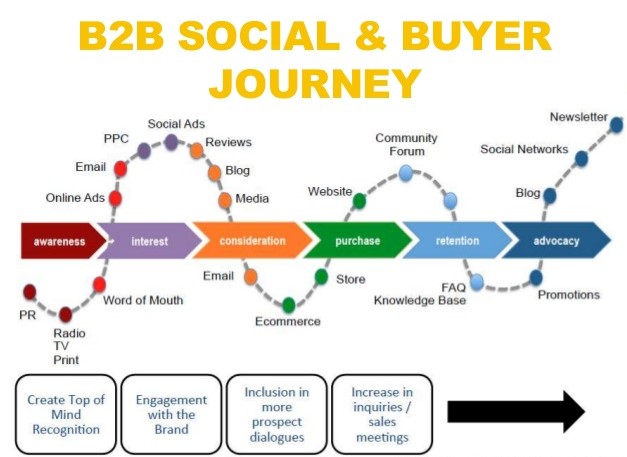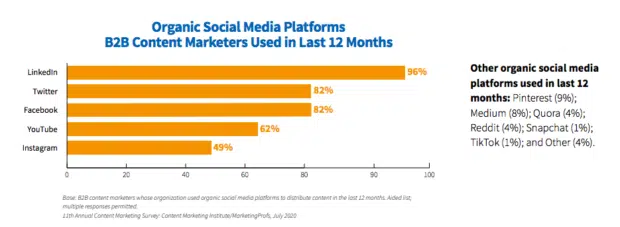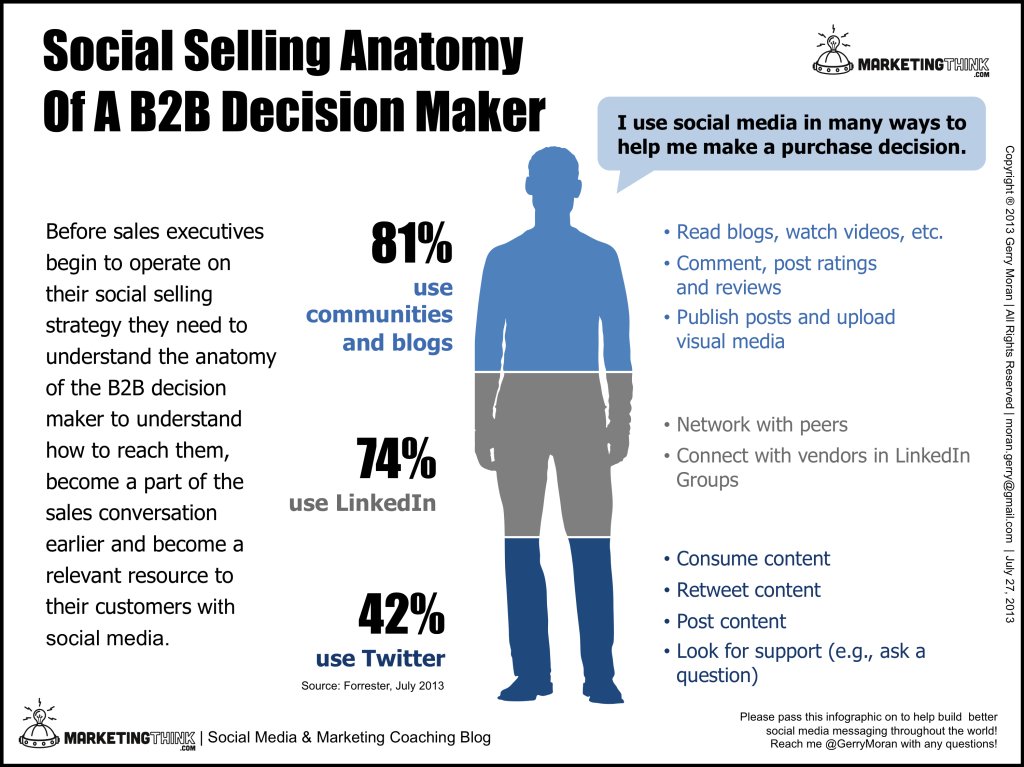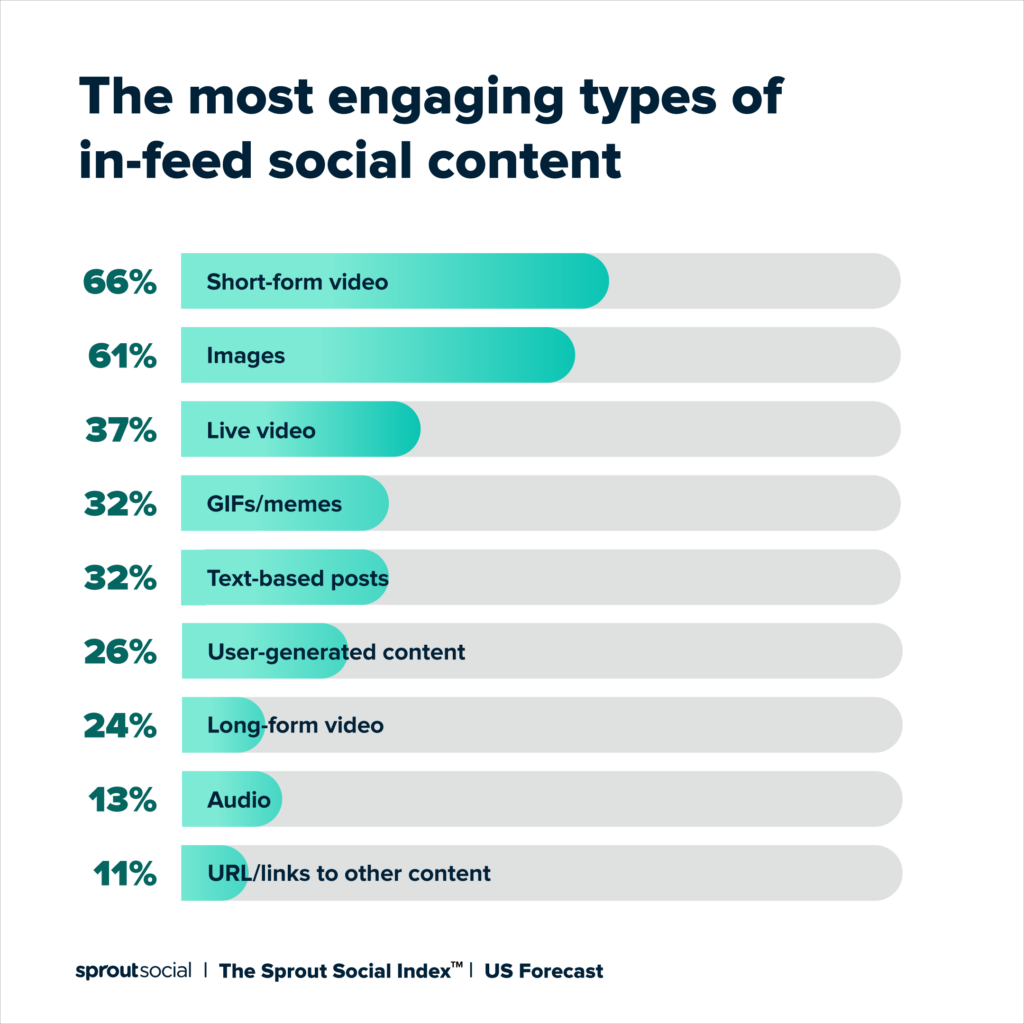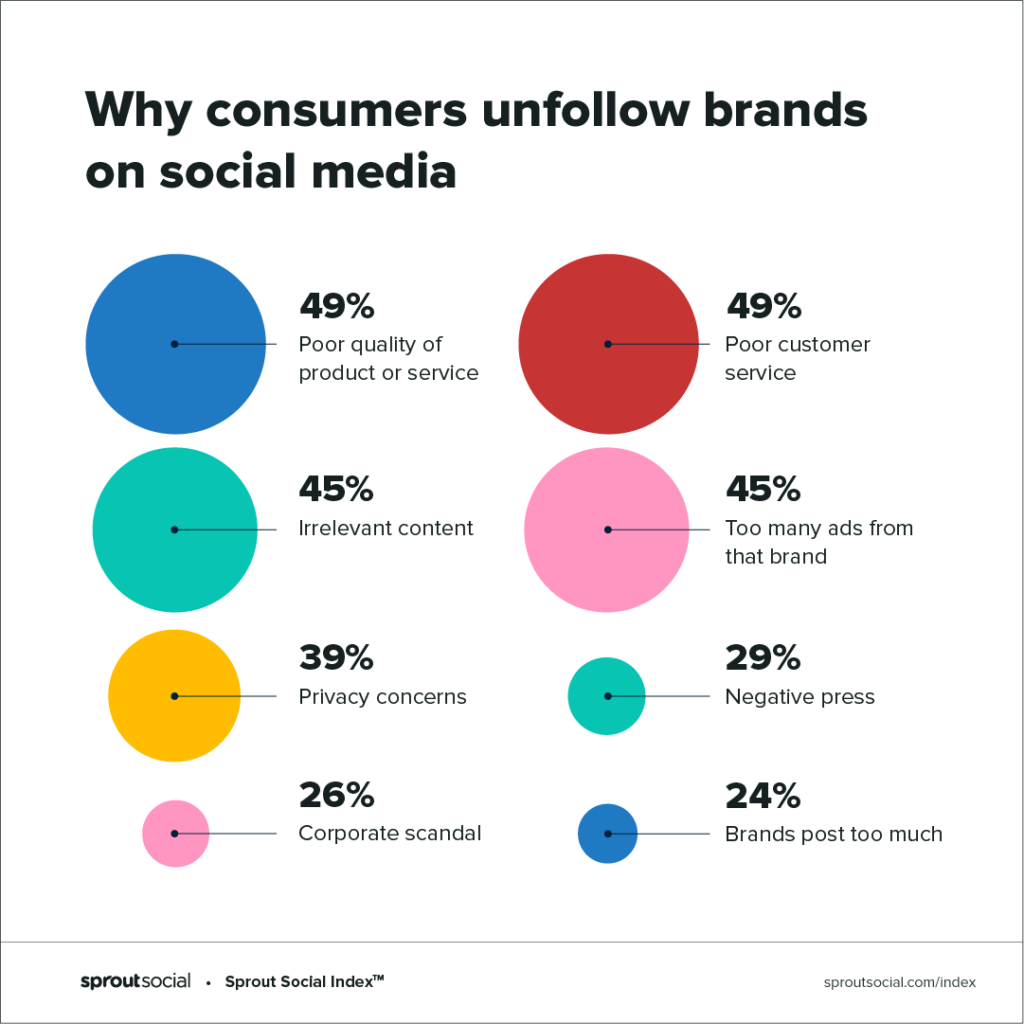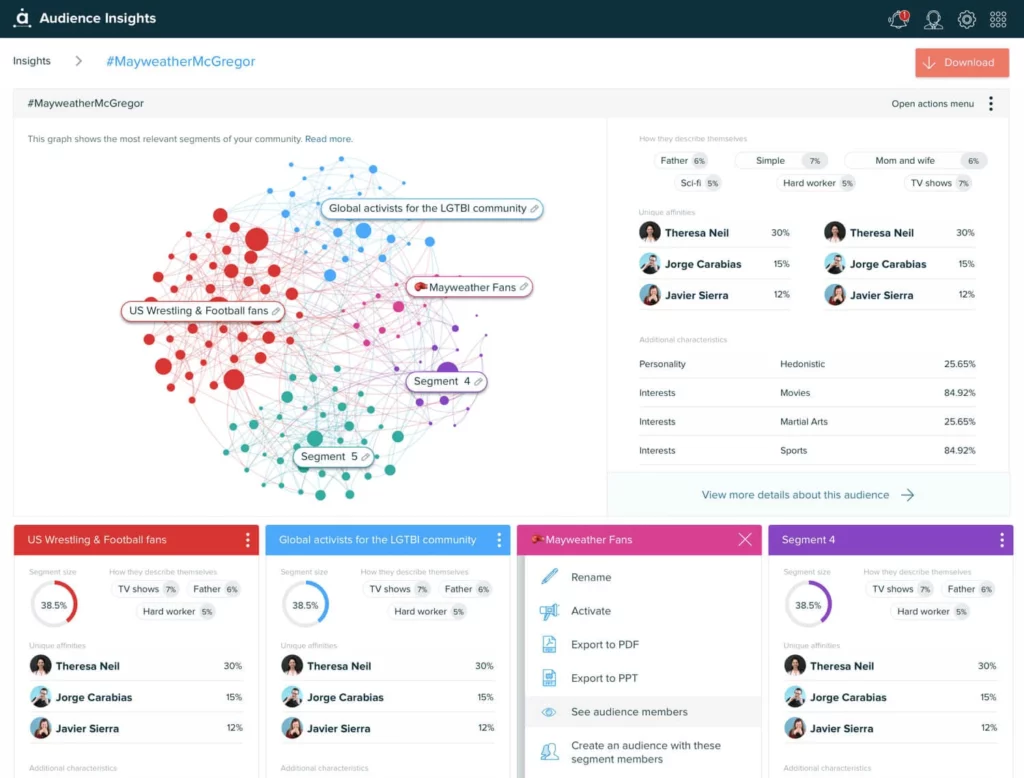While B2B businesses often prioritise traditional marketing efforts such as paid advertising, trade shows, and cold calling, it’s essential to recognise that social media can also be a valuable platform for B2B marketing.
Many B2B brands have successfully utilised social media to promote their businesses. So, if you want to market your B2B business on social media, here are some strategies to consider.
What is B2B social media strategy?
B2B social media strategies are precisely what they sound like; marketing your business on various social channels. As more and more B2B businesses focus on building trust and awareness on social media platforms, the space becomes more competitive.
Image credit: The Bitter Business
More than posting on social media is required. You must research and strategise an effective B2B social media marketing plan. This involves planning campaigns, tapping into trends, and engaging with customer interactions to meet goals. You should use data-backed market research to implement an effective social media strategy.
Why does B2B social media matter?
With brand trust at an all-time low, everyone, from other businesses to customers, relies on personal recommendations to inform purchasing decisions. Therefore, you must use your social media channel to build trust, promote brand awareness, and strengthen your relationship with your audience.
Image credit: Hootsuite
B2B companies use social media to get closer to customers than ever before. You can talk to other businesses one-to-one to determine what they want and how they wish you to interact with them. Creating a following on social media allows you to produce more targeted content for your leads generated.
Which social media platform is best for B2B?
The best social media site for your business depends on your industry and your clients. Many B2B companies cite LinkedIn as the best social platform. However, LinkedIn is mainly suitable for more professional industries looking to grow and expand.
If you work in a more practical sector, you might find YouTube or Facebook good platforms to share your knowledge. Most B2B purchase decisions depend on YouTube and Facebook, with only 47% of businesses using LinkedIn.
In short, the best social media channel to use is where your customers are. Whichever platforms you use, ensure you employ best practices for B2B social media strategies and focus on your audience.
How do I increase my social media engagement B2B?
The number of followers you have isn’t a marker of success. You could have hundreds of thousands of followers. Yet, this is meaningless without engagement. If only one of your followers engages with you, you’re doing it wrong.
That’s where social selling comes in. Social selling is about using social media platforms, like Facebook, Instagram or LinkedIn, to connect with folks, build relationships, and sell your products or services. It’s like having a laid-back chat with your mates at the pub, but instead of beers, you’re using posts, messages, and comments to connect with potential customers and sell your stuff.
Image credit: ExoB2B
Growing your social networks might sometimes seem like an impossible challenge, but it can be surprisingly simple. The main thing to remember is to maintain authenticity and transparency. People — and other businesses — want to know that you are also human. Below are our top tips for incorporating into your B2B social media strategy.
How do you create a B2B strategy?
Developing a social media strategy for your B2B company is a constant challenge. You’ll need to adapt and evolve as trends change and your customers grow.
1. Create goals
Firstly, you must set realistic, achievable, and measurable goals. Like any other marketing plan, your social marketing efforts must inform each action you make. To enhance your chances of success, you should define specific KPIs by deciding what success means to your brand.
Do you want to acquire new customers? Do you want to build a stronger relationship with existing customers? Your goals will inform which metrics you use to track performance. For instance, you’ll need to track metrics like clicks and conversions if you wish to generate leads. Alternatively, if your goal is to promote brand awareness, consider engagement, reach, and impressions.
2. Track KPIs
Now that you have your goals, you must determine how to track performance through analytics tools. Many social media metrics and tools are available to help you understand whether you’re on track to meet targets, including:
- Use Google Analytics as a social media tool for B2B companies to assess which platform brings the most visitors to your site.
- HubSpot Social monitors mentions and social media engagement to compare the performance of different platforms, campaigns, and tactics.
- CoSchedule tracks engagement and provides in-depth reports about post schedules.
- BuzzSumo reveals your most shared links to help you find industry influencers.
3. Refine and segment your target audience
You need more than just knowing your target audience. You must also understand the role of each participant throughout the sales funnel. Who are the decision-makers in your audience of B2B buyers? Refine their buyer persona with sub-segments and group characteristics to inform your social media strategy.
With a better understanding of pain points, challenges, wants, and needs, you can create more relevant content and dominate the B2B market.
4. Watch your competitors
As a social media marketer, you must consider your competitor’s marketing strategies. Take note of their campaigns and success rates. Moreover, if you have similar target audiences, use their work to inspire your social media B2B content marketing.
However, you must remember that watching your competitors’ social media content doesn’t mean copying them. While you’re in the same industry with an overlapping audience, you’re different companies at the end of the day. Look for opportunities your competitors have missed and stay true to your brand story.
5. Share original content
Google, Facebook, Twitter, Instagram, and others continually evolve their algorithms. The general direction is toward original and relevant content. It may seem obvious, but you must create content to generate success, not just curate and redistribute content from other sources. Your audience will know what is yours and what you have posted just to post something.
Rather than making a blog post every day, consider scaling back. It’s all about quality over quantity; you don’t have to post on every platform daily. Moreover, consider other options, such as user-generated content, to keep your platform active.
6. Use different features
Social media platforms continually roll out new features. Be the first to try them out. Instagram Stories, Twitter polls, and LinkedIn documents are all excellent examples of multimedia formats to utilise on each channel.
Image credit: Sprout Social
Moreover, stay up to date with each platform’s direction. For instance, Instagram has repeatedly made it clear it wants to focus on video content. As such, your marketing plans should create more video content to stay relevant with an effective social strategy.
7. Highlight your employees
People love social media because it humanises brands. In a world of B2B social media profiles, putting names and faces on the company can help you stand out a mile. Highlighting your employees’ advocacy is vital for large and small companies in any industry.
For instance, you might post a picture of the hard workers behind a product rather than the product itself. Celebrating your employees emphasises your company values.
8. Develop a distinguished brand voice
You can only begin achieving social media success by developing your brand voice. Whether writing a blog post, replying to Tweets, or posting, you must demonstrate a consistent and distinguished brand voice across every marketing channel. Just as your customers recognise your logo, they should also remember your brand voice.
Image credit: Sprout Social
Moreover, your brand voice should reflect your values and message. For instance, a jokey, informal tone wouldn’t be appropriate for a government figure or human rights charity.
9. Utilise social customer support
Social media is more than just a marketing tool. Many customers use the platforms to ask brands on social media about customer support issues. Few things are more frustrating for customers than tweeting or messaging a brand to hear nothing back.
Even if you don’t create a separate account dedicated to supporting, you should look for issues and reply quickly to ensure customer success. Responding to your audiences shows future customers that you care about them too.
10. Maintain consistency
Maintaining consistency is an essential part of a social strategy. Posting relevant, engaging content on every channel daily takes time, planning, and resources. Many companies have dedicated content creation and social media teams. However, smaller businesses may need to outsource or manage their social media accounts themselves.
If you’re just starting, create content that adds to your followers’ feeds rather than posting anything daily. It’s better to send out well-thought-out and strategic posts than post for the sake of it.
11. Engage in conversation
Social media is a two-way street. You must do more than just post social content to push your product at other businesses and expect them to pay attention. Your social media marketing strategy should engage in market trends and discourse throughout your industry.
When you start conversations to engage on social media, try to focus on topics your audience will find interesting, even if they’re not directly related to your product.
12. Practice social listening
The best way to post content your customers want is to practice social listening. This is how brands track their social media channels for brand mentions, competitors, and industry news. Social listening tools are vital for B2B online marketing success. How else can you understand how customers and potential prospects value your brand?
Image credit: Oberlo
Moreover, social listening helps businesses track and analyse campaign results to understand which channels are worth pursuing in their social media plan.
13. Paid ads or organic content?
Social media is a free form of marketing. However, content marketers might consider increasing a brand’s social media presence with paid social posts. Sponsored ads should differ from your other efforts on each social media platform, but a Facebook Ad might support your content strategy.
14. Schedule posts; measure results
So, you’ve planned your social media content, managed to schedule posts, and now you’re engaging with your audience. More is needed. Once posted, you must measure results to ensure you use your social resources wisely on fruitless endeavours.
Measure engagement, market insights, and conversion rates to understand what works and doesn’t. Experiment with schedule times and tactics if the results differ from what you expect.
What are the key success factors for B2B social media?
Social media best practices change all the time. Every industry is different; your brand and audience are unique. It’s worth experimenting with various social media strategies until you find one that works. However, keep your social media team active. To stay relevant, you must continually evolve, grow, and engage with your audience.
In summary
Most B2B brands use social media for marketing their products and services. Each platform has a different use, but the main ones for B2B marketers include LinkedIn, Facebook, and YouTube.
B2B social media strategies are not unlike B2C marketing.
Everyone on social media wants to know that there is a face behind the screen or brand name. To ensure B2B social media success, maintain consistency and engage with your audiences. If you do that, you’ll find building awareness, creating stronger relationships with audiences, and educating followers incredibly effective.
Are you struggling to create a digital marketing strategy that drives results? Let Aperitif Agency be your guide. Our team of experts specialises in developing custom digital marketing plans that are tailored to your business’s unique needs and goals.
Whether you’re looking to increase brand awareness, generate leads, or drive conversions, we have the skills and expertise to make it happen. Contact Aperitif Agency today and take the first step towards a more effective digital marketing strategy.

